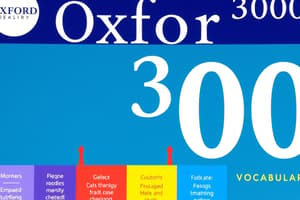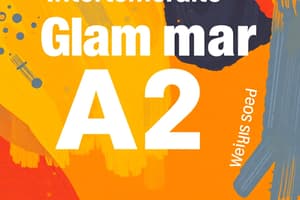Podcast
Questions and Answers
What is the purpose of the self-study lessons in this section?
What is the purpose of the self-study lessons in this section?
- To focus on grammar and vocabulary exercises only
- To offer interactive speaking exercises
- To test students' English proficiency
- To provide reading practice at different English levels (correct)
How are the self-study lessons organised according to the Common European Framework of Reference for languages (CEFR)?
How are the self-study lessons organised according to the Common European Framework of Reference for languages (CEFR)?
- Based on the reading skills needed at each level (correct)
- Based on the number of interactive exercises
- Based on writing and listening skills
- Based on the completion time required for each lesson
What can individuals do to determine which level of self-study lessons to choose?
What can individuals do to determine which level of self-study lessons to choose?
- Attend in-person reading workshops
- Take a free online English test (correct)
- Enroll in an elementary English course
- Register for an advanced English course
Flashcards are hidden until you start studying
Study Notes
Self-Study Lessons
- The purpose of self-study lessons is to provide individuals with the opportunity to learn and improve their language skills at their own pace.
Organisation of Self-Study Lessons according to CEFR
- The self-study lessons are organised according to the Common European Framework of Reference for languages (CEFR), which provides a standardized framework for language learning.
- The CEFR consists of six levels: A1 (Basic), A2 (Basic), B1 (Intermediate), B2 (Upper-Intermediate), C1 (Advanced), and C2 (Proficient).
Choosing the Right Level of Self-Study Lessons
- Individuals can determine which level of self-study lessons to choose by assessing their current language proficiency level.
- They can do this by considering their language skills in areas such as reading, writing, listening, and speaking.
- Additionally, individuals can take a language proficiency test or consult with a language teacher to determine their CEFR level.
Studying That Suits You
Use AI to generate personalized quizzes and flashcards to suit your learning preferences.



